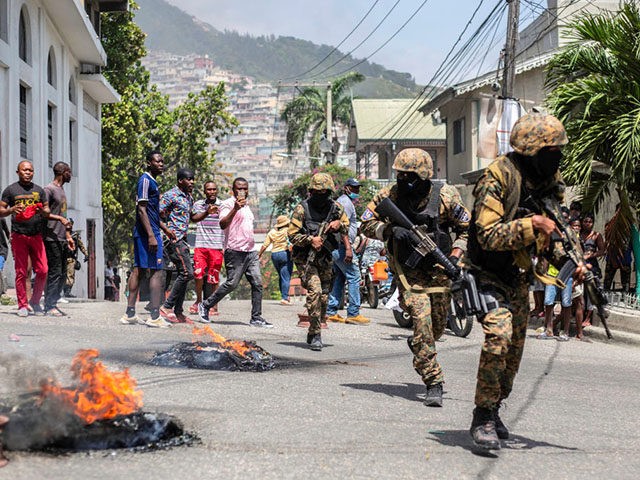An angry mob helped police in Haiti arrest at least 17 men on Thursday suspected of being part of a “commando” responsible for killing President Jovenel Moïse the day before, later surrounding the police station and demanding to burn the suspects alive.
Authorities announced late Thursday that they believed the full squad of assassins responsible for Moïse’s killing consisted of 26 Colombian nationals and two Haitian-Americans. Four of them died in a police shootout early Thursday and another three joined them later on. Authorities are believed to have another 17 suspects in custody.
Colombian officials confirmed those arrested were both citizens of the country and that some had experience in the Colombian military. Bogotá has agreed to cooperate with Haitian police to find those suspected of plotting, not just executing, the assassination, whom police believe remain at large.
Videos from Petionville, the Port-au-Prince suburb where police found what they believe to be the commando’s headquarters, show what appears to be a mob of hundreds of people surrounding the police station and attempting to storm it. Some in the video shout “burn them!” According to France24, some outraged citizens burned vehicles they believed to belong to the suspects as a substitute for the people themselves.
Other videos from the scene also clearly show civilians helping police by capturing suspects, tying them up, and handing them over to police custody. Other reports indicate that civilians also found the corpses of some suspects and handed them over.
Haitian authorities attempted to calm the situation to protect those inside the police station. Haitian Minister of Elections and Interparty Relations Mathias Pierre shared videos with reporters Thursday of the mob outside the police station and urged the public to remain calm and not attack the police.
“Special units are trying to protect the police station because the populace is very upset and trying to get to them [the suspects], to burn them. We are trying to avoid this,” Pierre said.
A group of heavily armed men, whom police say were speaking English and Spanish, broke into President Moïse’s home in the early morning hours of Wednesday and shot both him and First Lady Martine Moïse. The first lady survived and was flown to Florida this week to be treated for gunshot wounds. The president reportedly took at least 12 bullets; witnesses claimed he was found with one of his eyes blown out. The gunmen reportedly left the president’s child, also at home at the time, unharmed.
Haitian police have not offered any clarity on what motive could have led to the assassination. International observers considered Moïse significantly unpopular and plagued by enemies. Leaders of the Haitian opposition for months have rejected Moïse as illegitimate on the grounds that he has been president since 2015 and his term ended this year; Moïse claimed that he was only formally sworn in two years later, in 2017, and that he was legally the president of Haiti through 2022. In February, opposition leaders appointed an elderly judge, Joseph Mécène Jean-Louis, the “legitimate” president of Haiti, but Jean-Louis has not been seen in public since then and only claimed to be president in a video on social media that month.
Moïse had also repeatedly rejected pressure to accept money from the Chinese Communist Party in exchange for cutting ties with the government of Taiwan. Haiti is one of the world’s few remaining nations to formally accept Taiwan’s sovereignty and host a Taiwanese embassy.
In a bizarre twist Thursday, authorities confirmed they had found 11 of the suspected assassins hiding in the Taiwanese embassy in Port-au-Prince. The government of Taiwan said in a statement that the police arrests at the embassy went “smoothly” as a result of cooperation between the two nations and, like Colombia, vowed to cooperate to bring justice in the case. Taipei congratulated Haitian police for the rapid response to the suspects’ presence at the embassy.
“The cruel and barbaric assassination of HE [His Excellency] President Jovenel Moïse is a major international event and has completely shocked the whole world,” a statement from the Taiwanese government read. “Taiwan, as a responsible member of the international community, a long-time loyal friend, and a credible partner of the Republic of Haiti, … authorized [police] to conduct a search operation in order to demonstrate justice and reveal the truth about the incident as soon as possible.”
Outside of the embassy, at the Petionville house, police found a large cache of weapons and items apparently stolen from the presidential residence. According to the Haitian newspaper Le Nouvelliste, police told reporters that the suspect home contained, among other things, five firearms, “the server of the surveillance camera of at President Jovenel Moïse, a BNC checkbook in the name of Mr. and Mrs. Jovenel Moïse, twenty bags, axes, wire cutters, clothes, food and money.” The suspects also possessed significant amounts of American cash and multiple cell phones, according to police.
Haitian law enforcement described the two Haitian-Americans implicated in the plot as “translators” and claimed that the group was not tasked with assassinating the president, but merely with abducting him, according to Le Nouvelliste. They did not elaborate on any theories as to why the operation resulted in Moïse’s death if so. France 24 quoted police authorities as saying, however, that “foreigners came to our country to kill the president.”

COMMENTS
Please let us know if you're having issues with commenting.